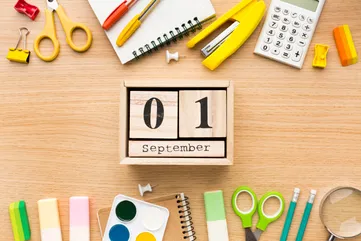SMART Goals
SMART goals transform "do better in school" into "complete all math homework this week," giving teens clear targets and paths to success.
Why vague goals fail
Goals like "study more" or "get organized" provide no clear action steps or success metrics, guaranteeing frustration.
Problems with non-SMART goals:
• No clear definition of success
• Can't track progress
• Too overwhelming or too easy
• No deadline creates infinite postponement
• Disconnected from actual priorities
• Impossible to know when achieved
SMART criteria force clarity that drives action and enables celebration of achievement.
You're not alone
If your teen sets goals that never materialize, or can't tell if they're making progress, they need the SMART framework. Most people set vague intentions rather than actionable goals. Teaching SMART goal-setting provides a lifelong tool for achievement.
What it looks like day to day
Student
Your teen changes "get better grades" to "raise math grade from C to B by completing all homework and attending tutoring twice weekly this quarter."
Parent
You help transform "be more organized" into "spend 5 minutes before bed putting tomorrow's materials in backpack for one month."
Tiny steps to try
Build SMART goals systematically.
- 1
Specific
Change "exercise more" to "walk for 20 minutes." Clear action, not vague intention.
- 2
Measurable
Include numbers. "Read 10 pages daily" not "read more." Progress becomes visible.
- 3
Achievable
Start smaller than you think. Success builds momentum for bigger goals.
- 4
Relevant
Connect to teen's values, not parent's. Their motivation, not your priorities.
- 5
Time-bound
Set specific deadline. "By Friday" creates urgency that "eventually" never will.
Why SMART goals matter
SMART goals teach teens that achievement comes from clear planning rather than wishful thinking or natural talent.
This framework builds executive functioning skills and self-efficacy. Teens learn to break overwhelming desires into manageable steps. Success with SMART goals creates confidence and momentum. The process teaches planning skills valuable throughout life.
Ready to help your teen thrive?
Get personalized 1-on-1 coaching to build better habits and boost grades. Join 10,000+ families who trust Coachbit.
Frequently Asked Questions
My teen resists the SMART framework as too rigid. What should I do?
Start with just one or two criteria. Even adding measurement or deadline improves vague goals. Frame it as an experiment to see if structure helps. Let them experience the satisfaction of achieving a SMART goal, which often converts skeptics.
How many SMART goals should teens have?
Start with one. Multiple goals divide focus and reduce success likelihood. Once one SMART goal becomes habit or is achieved, add another. Quality over quantity. Better to achieve one SMART goal than abandon five.
Related Terms
Accountability Partner
An accountability partner is someone who provides regular check-ins, encouragement, and gentle pressure to help maintain commitment to goals and habits.
Goal Setting
Goal setting is the process of identifying specific, achievable objectives and creating actionable plans to reach them within defined timeframes.
Planning and Prioritization
Planning and prioritization are executive functions that involve organizing tasks, determining importance, and sequencing activities to achieve goals efficiently.
Progress Tracking
Progress tracking is systematically monitoring advancement toward goals through measurable indicators, maintaining motivation and enabling strategy adjustments.
Self-Efficacy
Self-efficacy is the belief in your ability to succeed at specific tasks or challenges, directly influencing motivation and persistence.
Related Articles

Finding Order in the Chaos – Setting up Calendars for Kids
Creating a calendar and daily schedule for kids can be beneficial to manage school, homework, extracurriculars and hobbies. Color-coding and time-blocking are helpful tools for kids with ADHD.
Read article
3 Ways an Executive Functioning Coach Can Help Your Child
Discover why executive functioning skills are crucial for your child's success. Learn how an executive functioning coach can make a difference
Read article
